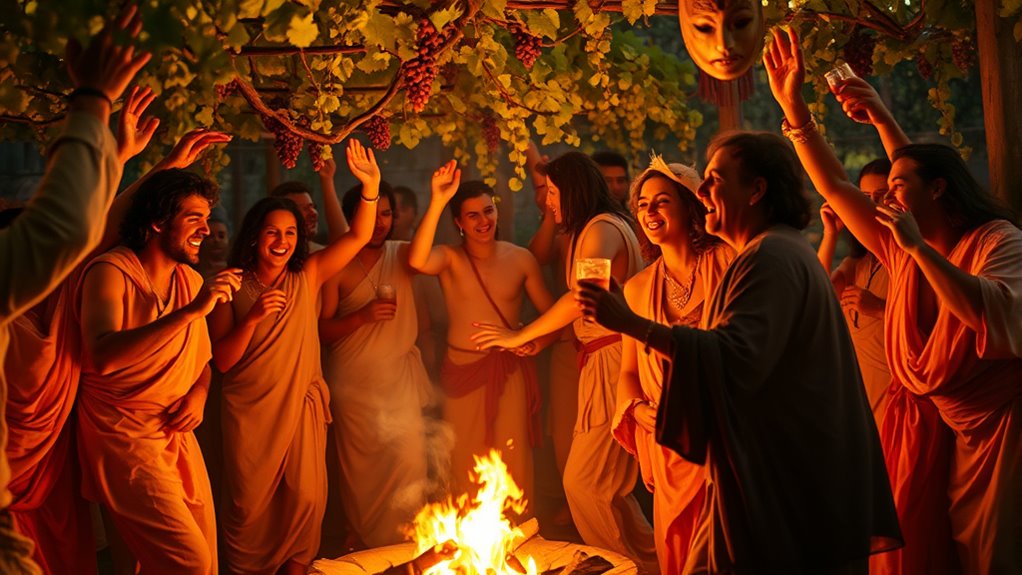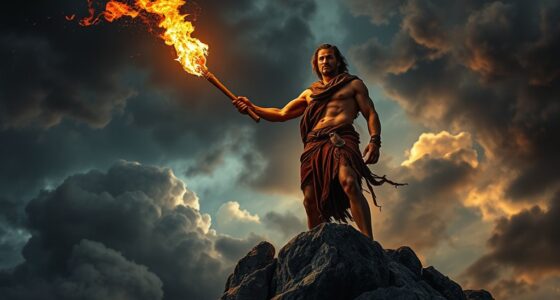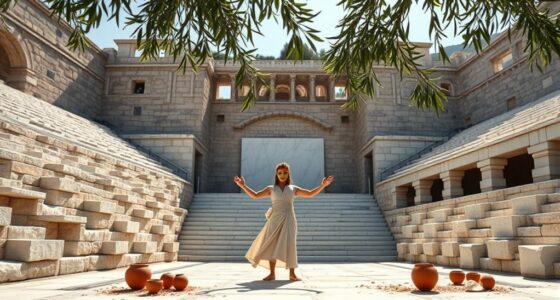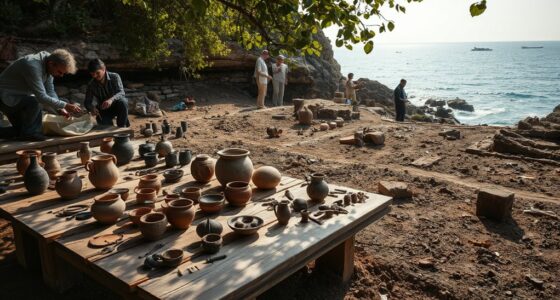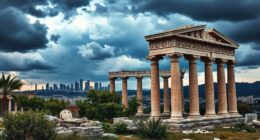Dionysus’s rituals of divine madness use dance, wine, and communal celebration to break down social constraints and elevate participants into ecstatic states. As you join in, you experience trance-like dance that dissolves self-awareness and connects you to divine energy. Wine amplifies this effect, loosening inhibitions and deepening emotional openness. These moments of joy and chaos create a powerful sense of unity and divine connection—if you’re curious, there’s more to discover about how these celebrations foster collective well-being.
Key Takeaways
- Dionysus embodies divine madness through ecstasy, trance, and ritual dance that dissolve self-awareness and connect participants to divine energy.
- Rituals break social constraints, encouraging spontaneous, frenzied movement that fosters communal unity and emotional release.
- Wine acts as a catalyst, amplifying divine madness by loosening inhibitions and deepening sensory and emotional experiences.
- Collective joy in Dionysian rituals strengthens community bonds and offers a temporary escape from everyday routines.
- Embracing chaos and ecstatic celebration reveals divine harmony and the unrestrained, divine essence of human existence.
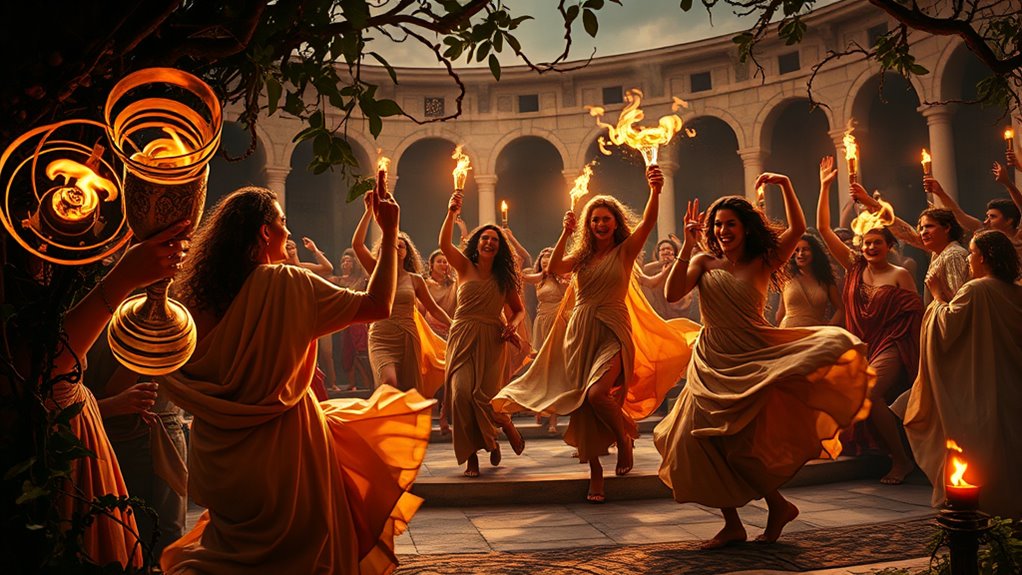
Dionysus, the Greek god of wine, ecstasy, and revelry, embodies the concept of divine madness that transcends ordinary understanding. When you immerse yourself in the rituals dedicated to him, you enter trance states that dissolve the boundaries between self and collective experience. These trance states often manifest through ecstatic dance, where movement becomes a form of prayer, a way to connect with the divine energy flowing through the community. As you dance wildly and abandon inhibition, you tap into a primal force that elevates your consciousness beyond rational thought. This dance isn’t just physical; it’s a spiritual journey, a gateway to a state of heightened awareness where joy and chaos intertwine seamlessly.
Immerse in divine madness through ecstatic dance that dissolves boundaries and elevates consciousness.
The rituals honoring Dionysus are designed to break down social constraints, encouraging spontaneous expression and collective joy. During these ceremonies, you may find yourself caught up in a frenzied rhythm, losing track of time and self-awareness. The ecstatic dance becomes a communal act, a shared experience that unites everyone in a celebration of life’s most exhilarating aspects. Through movement and music, you enter a trance-like state that allows you to access deeper emotional layers, releasing pent-up tensions and embracing unfiltered passion. This collective joy isn’t just entertainment; it’s a spiritual act of liberation, a temporary escape from the mundane confines of daily life.
Engaging in such rituals can also foster a sense of collective well-being, strengthening community bonds through shared emotional experiences.
Wine plays a vital role in amplifying this divine madness. As you partake in Dionysian rituals, the wine loosens your inhibitions, making it easier to surrender to the moment. It’s not merely about intoxication but about entering a different mental space — one where the usual rules don’t apply and where you can experience a profound sense of unity with others. The wine acts as a catalyst, heightening your senses and opening pathways to ecstatic states that deepen your connection with the divine and with your community. In this altered state, you’re more receptive to the energetic vibrations of the music, dance, and collective emotion, making the experience more intense and meaningful.
In essence, Dionysus invites you to embrace divine madness through trance states, ecstatic dance, and shared revelry. These rituals serve as a reminder that the greatest joy often lies beyond rational control, in moments where you surrender to the chaos and rediscover a sense of collective harmony. It’s in these wild, unrestrained celebrations that you glimpse the divine nature of human existence, carried on the waves of wine, dance, and ecstatic unity.

Sacred Woman, Sacred Dance: Awakening Spirituality Through Movement and Ritual
As an affiliate, we earn on qualifying purchases.
As an affiliate, we earn on qualifying purchases.
Frequently Asked Questions
How Did Dionysus Influence Modern Celebrations of Wine and Festivity?
You see, modern celebrations of wine and festivity owe a lot to historical wine festivals that emphasize communal joy and shared experiences. These traditions inspire contemporary events like wine tastings and harvest festivals, where people gather to celebrate abundance and culture. Dionysus’s influence is evident in how these festivities focus on collective joy, ritual, and the transformative power of wine, connecting ancient practices with today’s joyful communal celebrations.
What Are the Psychological Effects of Dionysian Rituals on Participants?
You experience psychoactive effects during Dionysian rituals, which can lead to altered states of consciousness and heightened emotions. These rituals often boost group cohesion, making participants feel more connected and unified. The collective joy and shared experiences foster a sense of belonging, reducing inhibitions and encouraging expressions of spontaneous joy. Overall, such rituals can deepen emotional bonds and promote a sense of community through powerful psychological effects.
Are There Contemporary Practices Inspired by Ancient Dionysian Rites?
They say, “Old habits die hard,” and that’s true for many modern practices inspired by ancient rites. Today, you can find modern ecstatic dance and contemporary ritual arts that echo Dionysian themes of collective joy and surrender. These practices foster community, self-expression, and emotional release, just like ancient Dionysian rituals. By embracing these traditions, you reconnect with primal energy, celebrating life through dance, music, and shared experience.
How Did Dionysus’s Worship Impact Ancient Greek Social Hierarchy?
You might not realize it, but worship of Dionysus shaped social hierarchy by fostering ritual hierarchy and promoting social cohesion. During Dionysian festivals, boundaries blurred as participants, regardless of status, joined in collective celebrations, challenging traditional class distinctions. This shared experience strengthened community bonds, breaking down social barriers, and highlighting a collective identity. So, his worship played a significant role in uniting people and subtly reshaping societal structures.
What Symbols Are Most Associated With Dionysus in Art and Literature?
In art and literature, you’ll notice Dionysus is often linked with symbolic motifs like vines, grapes, and thyrsus. These mythological representations highlight his connection to wine, fertility, and ecstasy. You might also see imagery of leopards, masks, and satyrs, emphasizing his wild, liberating nature. These symbols vividly portray his role as a god of chaos and celebration, making him a central figure in stories of divine madness and joy.

Deco Wine Tasting Flight Sampler Board – Set Includes Four 6 oz Decanter Glasses & Wood Paddle Chalkboard – Great for Charcuterie Boards, Wine Taste Testing, Date Nights – Valentines Day Gift for Her
Wine Tasting Flight Sampler Set – Take your at-home wine tasting to a whole new level with your…
As an affiliate, we earn on qualifying purchases.
As an affiliate, we earn on qualifying purchases.
Conclusion
Now that you’ve seen how Dionysus embodies divine madness, you realize it’s like a wild river flowing through your soul—sometimes chaotic, but always alive. His rituals and wine invite you to let go of control and embrace collective joy. By surrendering to this sacred chaos, you tap into a deeper part of yourself, where passion and community collide in a celebration that’s as timeless as the god himself.

Iconikal 5-Pair Nylon Exercise Drumsticks 14.75-Inch Blue Green Purple Red Yellow Aerobic Workout Dance Youth Drumming Group Activity
Vibrant 5-Color Set: Energize your workout with 5 pairs of nylon drum sticks in blue, green, purple, red,…
As an affiliate, we earn on qualifying purchases.
As an affiliate, we earn on qualifying purchases.

Sacred Ritual Incense Sticks and Holder Bundle – Satya Incense
This is a bundled product that includes Sacred Ritual incense of Satya incense and Trumiri incense holder.
As an affiliate, we earn on qualifying purchases.
As an affiliate, we earn on qualifying purchases.
